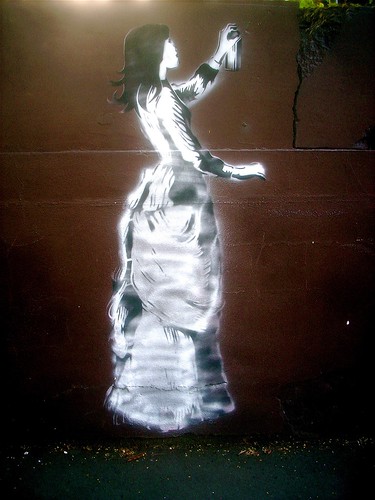This room is good for pacing. I have an oddly-comfortable mattress, good for sitting as well as sleeping. I have a decent expanse of wooden floor. I have a balcony, with a view. To the right, a cemetary. To the left, the sad remnant of a doomed icon of Weimar modernism: a department store, built in 1929 as one of the world’s largest, destroyed in 1945, since rebuilt more shabbily and to prosaically human dimensions.
Excellent weekend so far. Last night, went to a gallery opening, which turned out to be comfortingly familiar, full of gothic fairytale fantasies. And enlightening in that familiarity: I’d not realised how well the various tropes of that world hold together, as a language as internally consistent, and as flexible, as surrealism or futurism or any other art movement.
No politics there. No sex (many naked women, widespread kinky undertones, but all in an austere, inhuman style). Little trace of the 20th century, barring the occasional landscape of post-industrial decay. Religion only as a source of pre-packaged pathos. What’s present is connected to, and for all I know inspired by, Neil Gaiman and Amanda Palmer, Lewis Carroll and Tim Burton. Fairytale metamorphoses; proud grotesques. Clothes from Versailles; metalwork from Robber Baron America. All together, it feels like an exceptionally well-curated Deviantart sampler — and makes you realise that this is actually quite some achievement.
Then a poetry reading, which compensated for so-so texts by requiring each poet to mix a thematically-appropriate cocktail and pass it out to the audience in shot-glasses. Still a bit of a come-down, but followed by an early exit to a self-consciously shabby pub with two new acquaintances.
Tonight it’s time for the goths; I’ve not been out just to dance (i.e. alone) for several months, and instead spent too many evenings at anodyne gigs played by friends of friends. I need my fix of anonymous, black and cynical, and I suspect in the process I’ll satisfy whatever urges made me so love yesterday’s exhibition.
Until then I’m sat cross-legged on that mattress, listening to last.fm psytrance, splurging out words in all directions possible. You’ll eventually get bored of me saying this, but I won’t: Life is good.
